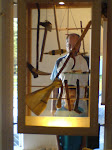“After knowledge – what?”
>“Is contemporary psychoanalytic thought just another wolf in sheep’s cloth?” Where a student of contemporary psychoanalytic thinking writes about the tradition in therapy to “blaming the child and protecting the parents”. This person mentions the work of a James Fosshage and thinks this seems to much different from the classical psychoanalytic emphasis on interpretation and the ALL-KNOWING ATTITUDE of many psychoanalysts and psychotherapists!!!
She (or he?) wonders
“Has contemporary psychoanalytic thinking really understood and effectively responded to ‘the old tradition of blaming the child and protecting the parents’ /…/ Or, is contemporary psychoanalytic thought just another wolf in sheep’s clothing? Have you changed your thinking about the value of psychoanalytic psychotherapy?” (which has influenced other methods and therapy-concepts more or less??)"
I will quote Miller’s whole reply:
“Thank you for your letter. You seem to be on the right track. No, I have not changed my opinion on psychoanalysts and self-psychologists and think today even more strongly than before that they avoid confronting the issue of child abuse, which confrontation I think is absolutely unavoidable if "empathy" should mean more than a nice word. Words are often used to pretend something that doesn't exist. The Church loves to use the word "compassion" but allows without any restriction that children are being beaten so that God could "find pleasure in them.” For 2000 years NOBODY ever protested against this practice.
As most of us were beaten children, we NEITHER learned TO HAVE EMPATHY with ourselves nor with the plight of other children. We learned to deny our pain to survive. But this is a big handicap for a therapist. Kohut, whom I knew personally, tried at first to open our eyes and hearts for what a child has to endure, but he felt very isolated in the psychoanalytic community. So he returned to their concepts at the end of his life, the concepts that Freud invented when he himself suffered from the rejection of the whole society after he had disclosed the sexual abuse by parents. As soon as he declared that patients talk only about their fantasies and not about real events he found a huge amount of followers that still seem very stable in their denial of the reality of child abuse.
To answer sufficiently to your very important question I would need to repeat what I have written already extensively elsewhere. Try to read the article on indignation on this web site (Dr. Lachman whom I mention there is actually a self-psychologist) as well as the last articles on my concept of therapy. If you have more questions concerning this issue you can write us again."
A grandmother wondered about a grandchild’s sleep disturbances.
Another reader wrote about “Schizophrenic families” which also is worth reading!!
Miller replies for instance as follows:
“It is true that incest families have much in common with families of schizophrenics where it is forbidden to see the truth and demanded to believe in lies. Because families like that seem to be much more frequent than healthy ones, we have trouble to be heard when we write and say the truth. Almost everything Laing wrote was right, but psychiatrists of today hardly mention him. We must conclude perhaps that they also learned very early to deny their truth and are afraid of coming in touch with it. So instead of listening to the patients and their stories, they make them silent and even more confused by giving them drugs."





























Inga kommentarer:
Skicka en kommentar